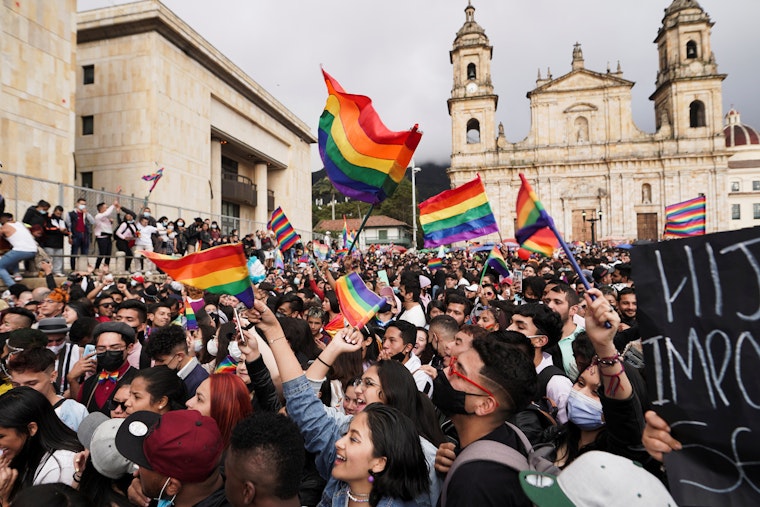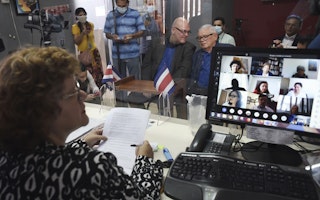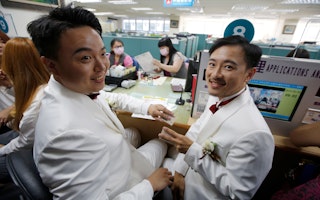Bridging Religion and Sexual Diversity in Latin America
By María Mercedes Acosta

Like many Latin Americans, Enrique Vega Dávila, 36, grew up in a non-practicing Catholic family. But from a very young age, he dreamed of actually living the Catholic faith, and he chose to do so by becoming a priest. About six years into seminary, his dream was interrupted when he realized he was gay. Continuing as a member of the Catholic clergy would require him to live a double life, as so many other priests have done for centuries.
The Catholic church isn’t the only religious institution to reject ordination of or condemn people identifying as LGBTQ+. But in recent history, several Protestant denominations have chosen to be more inclusive by ordaining LGBTQ+ clergy and allowing same-sex marriage. Dávila took advantage of that change by becoming a Lutheran pastor, and he’s now obtaining a doctorate in gender studies at Iberoamericana University in Mexico City.
In his new denomination, he does not have to hide his sexual orientation, tattoos, earrings, or the makeup he sometimes likes to apply. He is well known as “el reverendo cuir” (the queer pastor). Everywhere he goes, and in every way he can, Dávila likes to remind people that religious freedom is for everyone and that no pastor or priest can prevent LGBTQ+ people from following whatever faith they believe in or loving whomever they choose.
Dávila is one of the protagonists of a multi-platform series of life stories produced by Sentiido, a nonprofit organization based in Bogotá, Colombia. Formed in 2011, Sentiido uses communications, research, and storytelling to reduce stigma and discrimination against LGBTQ+ people and leverage social change. Faith + Diversity, as the project is called, is part of Sentiido’s larger commitment to amplify the work of affirming faith communities.

Faith + Diversity began in 2017 and seeks to raise awareness about the many different ways in which LGBTQ+ people engage with religion and spirituality. Stories like Dávila’s are a reminder that Christianity is rooted in the core value of unconditional love, which is why it so often invokes Biblical phrases such as “love one another as I have loved them” or “do not judge and you will not be judged.”
For Sentiido, that also means refraining from labeling and dismissing opponents of sexual and gender diversity as “homophobic,” “transphobic,” or “anti-LGBTQ rights.” Real change—fundamental transformation—takes time, and for many, it can feel as if a new worldview is being “pushed” on them, which can exacerbate already existing polarization. At Sentiido, we also know that many people of faith understand Biblical teachings in a historical context and are open to the value of inclusion. Therefore, Faith + Diversity encourages dialogue with those willing to have conversations, reminding people of all faiths what they already know: that all humans are equal in the eyes of God.
At Sentiido, we also emphasize what unites us, rather than what divides us. For example, most Latin Americans place a very high value on their family and their faith. These shared values provide a common ground for conversations about dignity, love, empathy, understanding, and support, which can lead to addressing other issues like resilience, freedom, and solidarity.
Still, changing hearts, minds, and church policies is a process. For Dávila, it starts by letting LGBTQ+ people know they don’t have to heed the warnings of Catholic leaders who say that homosexuality is not a sin but homosexual acts are, or believe evangelical and Pentecostal ministers claiming LGBTQ+ people are making “wrong choices that must be corrected.” He affirms that divine love is bigger than a church, a religious leader, or a book; rather, it is an entire life experience.
The late Harvey Milk, a gay American politician and activist who was assassinated in 1978, once told a crowd that the LGBTQ+ community is simply asking for hope: “Hope for a better world, hope for a better tomorrow, hope for a better place to come to if the pressures at home are too great. Hope that all will be all right. Without hope, not only are the gays, but the Blacks, the seniors, the handicapped, the ‘us-es.’ The ‘us-es’ will give up.” He added that electing more LGBTQ+ people to public office would help to build that hope. “That gives a green light to all who feel disenfranchised, a green light to move forward,” Milk said. “It means hope to a nation that has given up, because if a gay person makes it, the doors are open to everyone.”
Calling out the inequality, injustice, and violence against LGBTQ+ people is as central to our work as it was to Milk’s activism. We want everyone to walk a mile in someone else’s shoes. To do so, we share the stories and experiences of LGBTQ+ people in their daily lives, in their homes and churches, while holding space for all people to feel heard and be seen, even those who may be struggling with their views about LGBTQ+ people.
George Lakoff, a researcher in the field of cognitive linguistics, says constant dialogue around societal problems without conversations focused on wide-reaching solutions can reinforce old mindsets. People connect best to stories in which LGBTQ+ people show up as their authentic selves. So rather than focus on statements like “a world without hate” or “a world without discrimination,” we promote stories that give us picture of the world we would like to live in. It’s a world in which everyone strives to do the right thing by their neighbor, because everyone wins when they do so.
Sentiido is a grantee of the Open Society Foundations.
María Mercedes Acosta is a journalist and co-founder of Sentiido.


